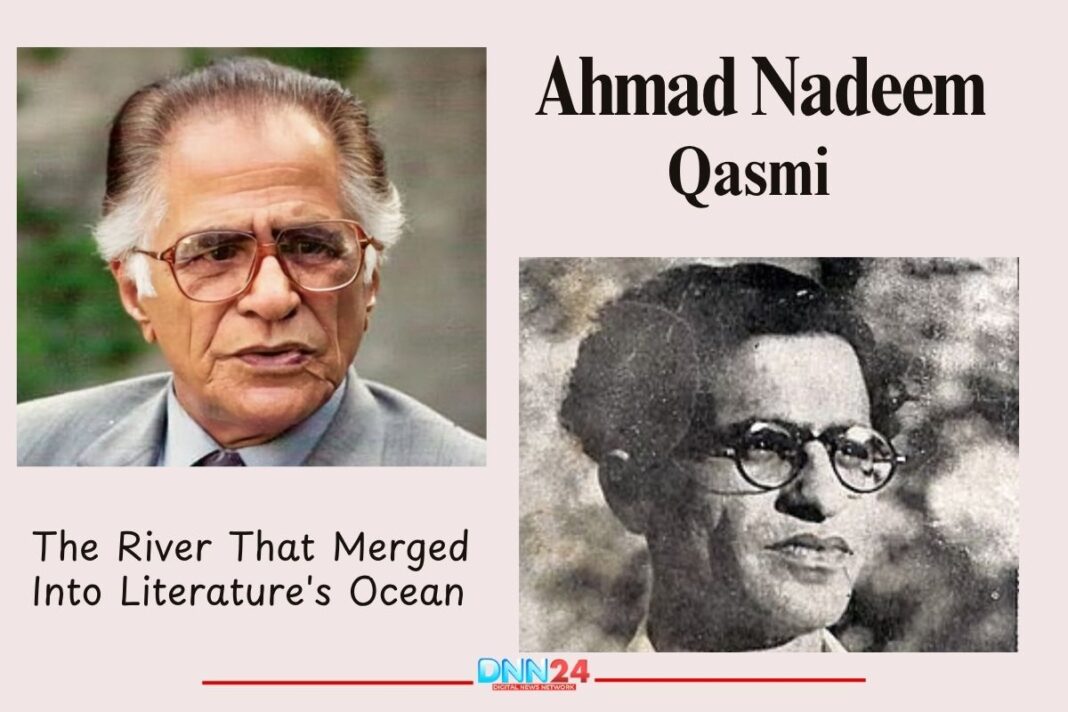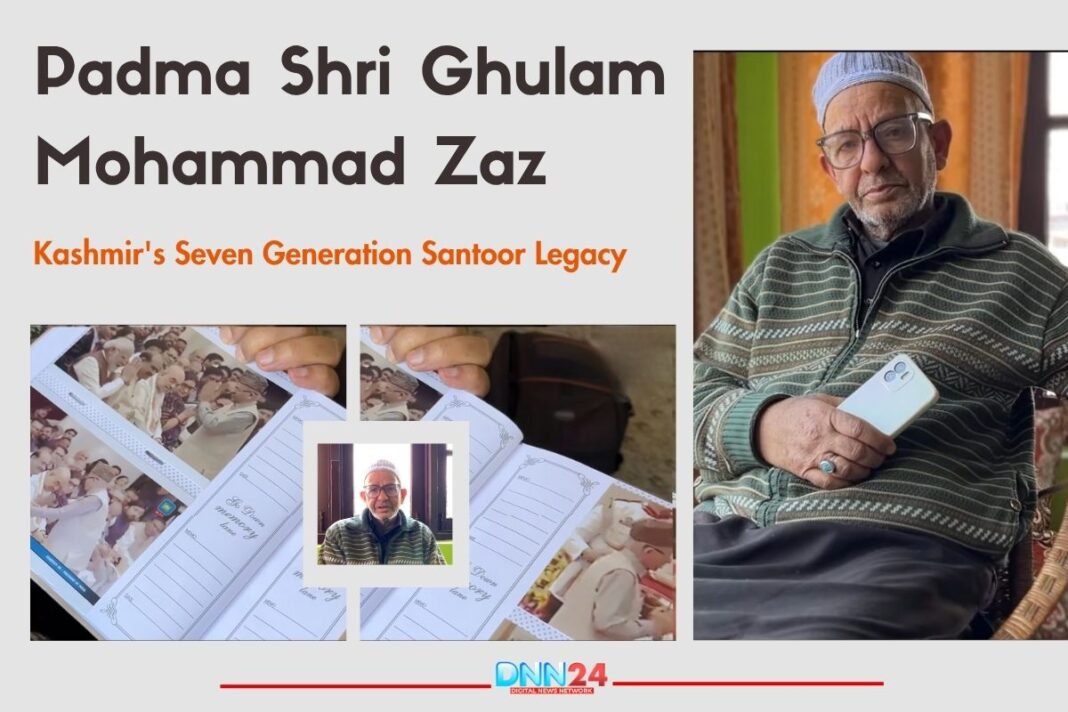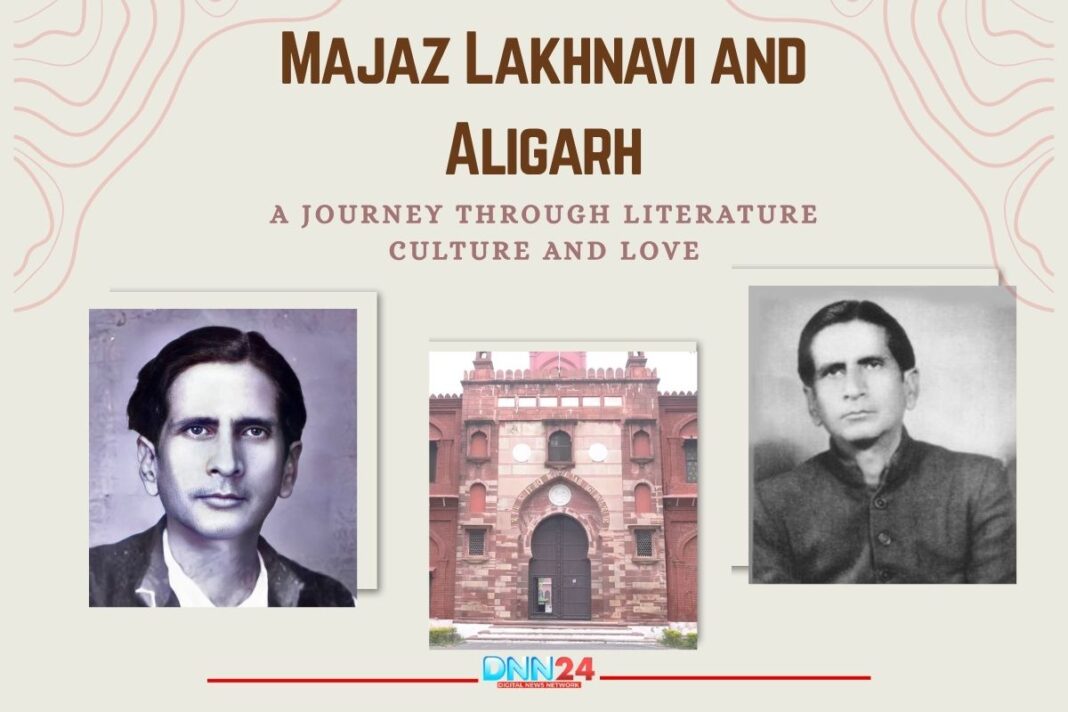Ahmad Nadeem Qasmi stands as one of the most influential figures in Urdu literature, a writer whose words gave voice to humanity itself. He founded the celebrated literary magazine ‘Funoon’, which became a launching pad for luminaries like Ahmad Faraz, Parveen Shakir, and Gulzar. His poetry was not merely an announcement of his presence but a declaration of a life devoted entirely to literature. Qasmi was far more than a poet or short story writer.
zindagi ke jitne darwaze hain mujh pe band hain
Ahmad Nadeem Qasmi
dekhna hadd-e-nazar se aage baDh kar dekhna bhi jurm hai
He was a walking institution of contemporary Urdu literature. Reading his work means experiencing the essence of Urdu culture and the spirit of Punjab’s soil. His writings carry the earthy fragrance of rural life, the depth of human emotions, and a social consciousness that made him a steadfast soldier of the Progressive Writers’ Movement. His contribution to Urdu literature remains unmatched, as he bridges traditional values with progressive thought.
ret se but na bana ai mere achchhe fankar
Ahmad Nadeem Qasmi
ek lamhe ko Thahar main tujhe patthar la dun
Birth and Early Journey
Ahmad Nadeem Qasmi was born on November 20, 1916, in the village of Anga, Khushab District, Punjab, during the British Indian era. His original name was Ahmad Shah Awan. He came from a family steeped in Sufi traditions, which explains the humanistic message that always shone through his poetry and prose. This spiritual heritage profoundly shaped his worldview and informed his lifelong commitment to social justice.
tujhe izhaar-e-mohabbat se agar nafrat hai
Ahmad Nadeem Qasmi
tu ne honTon ko larazne se to roka hota
He completed his education at various institutions and graduated from Punjab University, Lahore, in 1935. Initially, he took up government jobs, including a position as a sub-inspector in the Excise Department. However, the heart of a writer cannot remain confined to office files for long. In 1942, he resigned from this work because his temperament would not allow him to continue in such an environment. This decision marked a turning point, allowing him to dedicate himself fully to the literary world that called to him.
mujhe sameTo
Ahmad Nadeem Qasmi
main reza reza bikhar raha hun
na jaane main baDh raha hun
ya apne hi ghubar-e-safar mein har pal utar raha hun
Life at the Tip of the Pen
Qasmi’s true journey began when he immersed himself completely in Lahore’s literary atmosphere. This was an era when giants like Manto, Faiz Ahmad Faiz, and Imtiaz Ali Taj were writing history with their pens. Upon arriving in Lahore, he edited publications like ‘Tehzeeb-e-Niswan’ and the children’s magazine ‘Phool’. His editorial journey did not stop there. He collaborated with renowned magazines such as ‘Adab-e-Latif’, ‘Savera’, and ‘Naqoosh’, and also served as the editor of the daily newspaper ‘Imrooz’.
chhuTpuTe ke ghurfe mein
Ahmad Nadeem Qasmi
lamhe ab bhi milte hain
subh ke dhundalke mein
phul ab bhi khilte hain
However, what truly established him as a literary leader was his own magazine, ‘Funoon’. Started in 1962, this publication became an extension of Qasmi himself. He continued it with complete dedication for nearly half a century. This was not just a magazine. It was a literary sanctuary where countless young writers and poets, such as Ahmad Faraz, Parveen Shakir, Khadeeja Mastoor, and Hajra Masroor, found their wings to fly. Even someone as distinguished as Gulzar called him his mentor and teacher.
agar hai jazba-e-tamir zinda
Ahmad Nadeem Qasmi
to phir kis chiz ki hum mein kami hai
Soldier of Progress and Master of Stories
Qasmi was a strong pillar of the Progressive Writers’ Movement. He served as Secretary-General of this organisation in Pakistan in 1949. His writing was not just about artistry but about purpose. He raised his voice on behalf of the poor and the oppressed. This commitment led to his imprisonment several times on charges of activities against the establishment. His work in ghazal and nazm is evident in collections such as ‘Jalal-o-Jamal’ and ‘Dast-e-Wafa’, which reflect his humanistic philosophy.
mere aaqa ko gila hai ki meri haq-goi
Ahmad Nadeem Qasmi
raaz kyun kholti hai
aur main puchhta hun teri siyasat fan mein
zahr kyun gholti hai
However, his fame and importance shine brightest in his short stories. The subjects of his stories always revolved around rural life, people connected to the land, and their struggles. His collection ‘Chaupal’ from 1939 remains a milestone in this direction. Through these narratives, he captured the authentic voice of ordinary people, their joys and sorrows, their resilience and their despair, painting a vivid picture of life that resonated deeply with readers across generations.
raat ki uDti hui rakh se bojhal hai nasim
Ahmad Nadeem Qasmi
yun asa Tek ke chalti hai ki rahm aata hai
Criticism and Complex Relationships
Qasmi’s life and literary journey were not filled only with praise. Some critics pointed to his narcissistic personality and his alleged buried dislike for contemporary poets, especially Faiz Ahmad Faiz. Professor Fateh Muhammad Malik’s book ‘Nadeem Shanasi’ contains letters from Qasmi that hint at these tensions. Perhaps this is the fate of every great writer that, along with admiration, their personal and literary rivalries also become topics of discussion.
ghair ki ho ke bhi tum meri mohabbat chaho
Ahmad Nadeem Qasmi
is ghaTa-Top andhere mein ye tare kaise
These controversies, however, do not diminish his contributions. They add another layer to understanding him as a complete human being rather than an idealised figure. His competitive spirit and strong opinions were key factors in making him a force in Urdu literature, pushing boundaries and challenging conventions throughout his career.
rasta nahin milta
Ahmad Nadeem Qasmi
munjamid andhera hai
phir bhi ba-waqar insan
is yaqin pe zinda hai
Final Journey and Legacy
Ahmad Nadeem Qasmi passed away on July 10, 2006, in Lahore due to complications from asthma. His death marked the end of a glorious era in Urdu literature. During his lifetime, he received Pakistan’s highest honours for his literary services. He was awarded the Pride of Performance in 1968 and the Sitara-e-Imtiaz in 1980. These recognitions stand as proof of the power of his pen. The naming of 7th Avenue in Islamabad after him also demonstrates his stature and importance.
chalo ek raat to guzri
Ahmad Nadeem Qasmi
chalo saffak zulmat ke badan ka ek TukDa to kaTa
aur waqt ki be-intihai ke samundar mein
koi tabut girne ki sada aai
Ahmad Nadeem Qasmi was a river that flowed with the message of humanity, merging into the ocean of Urdu literature. He remains alive today through his poetry, his short stories, and the legacy of his magazine ‘Funoon’. His work continues to inspire new generations of writers and readers, reminding us that literature at its best serves humanity and speaks truth to power with courage and compassion.
Also Read: Bilqis Zafirul Hasan: The Poet Who Found Her Voice in Silence
You can connect with DNN24 on Facebook, Twitter, and Instagram and subscribe to our YouTube channel.



